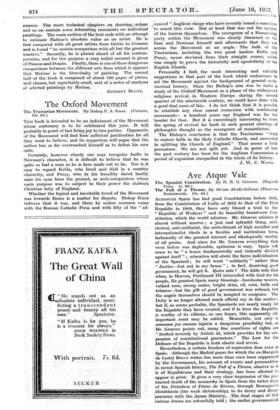The Oxford Movement
The Tractarian Movement. By Bishop E. A. Knox. (Putnam.
108. 6d.)
Tins book is intended to be an indictment of the Movement whose centenary is to be celebrated this year. It will, probably in point of fact bring joy to two parties. Opponents of the Movement will find here sufficient justification for all they want to believe, and its supporters will argue that the author has so far overreached himself as to defeat his own Olds- Certainly, however clearly one may recognize faults in. Newman's character, it is difficult to believe that he was quite so bad a man as he is here made out to be. Nor is it. easy to regard Keble, who lived and died in a country. obscurity, and Pusey, who in his humility dared hardly raise his eyes from the ground, as arch-conspirators whose main purpose was to subject to their power the stalwart Christian laity of England.
Whether the logical and inevitable trend of the Movement was towards Rome is a matter for dispute. Bishop Knox believes that it was, and there he makes common cause with the Roman Catholic Press and with fifty of the " ad- ,,yanced " Anglican clergy who have recently issued a manifesto to assert this view. But at least that was not the opinion of the leaders themselves. The emergence of a Roman iziag party within the Movement was clearly discerned at the time and Newman himself said afterwards that they eta across the Movement at an angle. The bulk of the Tractarians, including the two great leaders Keble and Pusey, never deviated from their straight course, which was simply to prove the historicity and apostolicity of the English Church.
Personally I find-, the most interesting -and valuable suggestions in that part of the book which 'endeavours to set the Movement against the background of general cede. siastical history. Since the Bishop's aim was to make a study of the Oxford'Illovement as a phase of the widespread religious revival in Western Europe during the second quarter of the nineteenth century, we could have done with a good deal more of this. I do not think that it is possible to establish any close causal connexion with continental movements : , a hundred years ago' England was far too insular for that. But it is exceedingly interesting to trace the spring of revival far back in such general stirrings of philosophic thought as the resurgence of romanticism.
The Bishop's conclusion is that the Tractarians " tried to restore faith in the Holy Catholic Church, and succeeded ha splitting the Church of England." That seems a little premature. We are not split yet. And in point of fact the past century has been for the Anglican Communion a period of expansion unequalled in the whole of its history.
J. W. C. WAND.










































 Previous page
Previous page